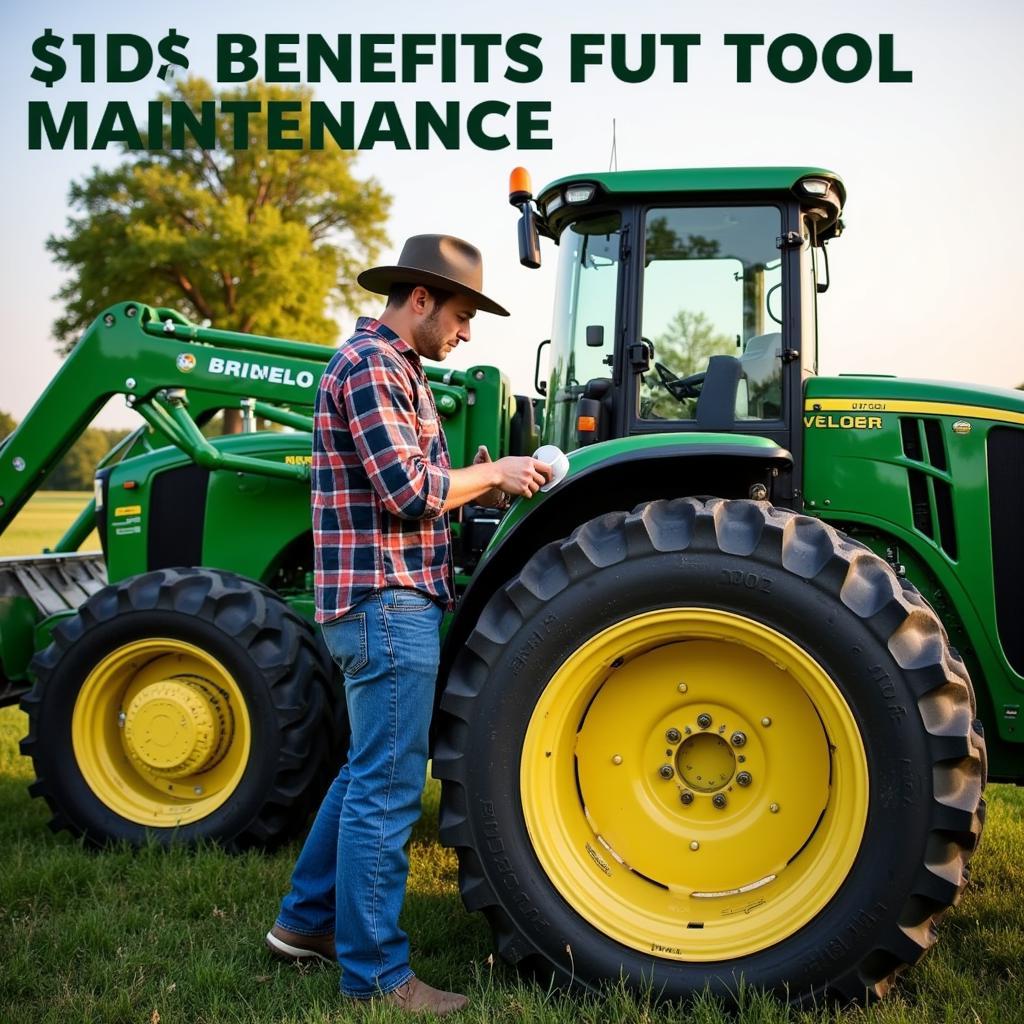Proper maintenance and care of farm tools are essential for ensuring their longevity, optimal performance, and overall farm productivity. Neglecting these crucial practices can lead to costly repairs, decreased efficiency, and safety hazards. This comprehensive guide will delve into the best practices for maintaining and caring for your farm tools, covering everything from daily cleaning to seasonal storage. Let’s explore how to keep your equipment in top shape, saving you time and money in the long run.
Why is Maintenance and Care of Farm Tools Important?
Well-maintained farm tools are the backbone of any successful agricultural operation. Regular maintenance and care not only extend the lifespan of your tools but also contribute to several key benefits, including:
- Increased Efficiency: Sharp blades, well-lubricated parts, and properly calibrated machinery operate at peak performance, maximizing efficiency and minimizing time spent on tasks.
- Cost Savings: Preventive maintenance is significantly cheaper than major repairs or replacements, saving you substantial money over time.
- Enhanced Safety: Maintaining tools in good working order reduces the risk of accidents caused by malfunctioning equipment or dull blades.
- Improved Crop Yields: Properly maintained tools contribute to healthier crops and higher yields by ensuring precise planting, efficient harvesting, and effective pest control.
- Higher Resale Value: Well-maintained tools retain their value better, allowing you to recoup a larger portion of your initial investment when you decide to upgrade.
Daily Maintenance Practices for Farm Tools
After each use, it’s crucial to clean your farm tools to remove dirt, debris, and plant residue. This simple step can significantly prolong their lifespan. Here are some daily maintenance practices:
- Cleaning: Use a brush, scraper, or pressurized air to remove dirt and debris from tools. For stubborn residue, use a mild detergent and water solution, ensuring you dry the tools thoroughly afterward.
- Sharpening: Regularly sharpen cutting tools like knives, pruning shears, and saw blades. Sharp tools are more efficient and safer to use.
- Lubrication: Apply lubricant to moving parts to prevent friction and wear. Choose the appropriate lubricant for each tool, considering factors like temperature and material compatibility.
- Inspection: Visually inspect tools for any signs of damage, such as cracks, bends, or loose parts. Address these issues promptly to prevent further damage.
Seasonal Maintenance and Storage
Seasonal maintenance involves more thorough cleaning, inspection, and preparation for storage. These practices protect your tools from the elements and ensure they are ready for use when the next season rolls around.
- Thorough Cleaning and Inspection: Clean tools meticulously and inspect them for any signs of wear and tear. Repair or replace damaged parts as needed.
- Lubrication and Protection: Apply a protective coating of oil or grease to metal parts to prevent rust and corrosion during storage.
- Proper Storage: Store tools in a clean, dry, and well-ventilated area. Hang tools on hooks or store them on shelves to prevent them from being damaged by moisture or pests. Consider neogen hoof care tools and evolutionary hoof care tools for specialized hoof care maintenance.
Maintaining Specific Farm Tools
Different types of farm tools require specific maintenance procedures. Here’s a brief overview:
Tractors and other powered equipment:
- Follow the manufacturer’s recommended maintenance schedule for oil changes, filter replacements, and other essential services.
- Check tire pressure regularly and inspect for wear and tear.
Hand tools:
- Sharpen blades regularly and ensure handles are secure.
- Apply a light coat of oil to metal parts to prevent rust.
Irrigation equipment:
- Flush irrigation lines regularly to remove debris and prevent clogging.
- Inspect sprinkler heads for damage and adjust as needed.
What are some specific maintenance tips for complex machinery like combines or harvesters? Focus on regular lubrication of moving parts, inspecting belts and chains for wear, and cleaning air filters. “Regular maintenance is crucial for expensive farm equipment. It’s much cheaper to perform regular maintenance than it is to replace a combine,” says John Deere Specialist, Robert Miller.
Conclusion
Maintenance and care of farm tools are crucial for maximizing their lifespan, ensuring optimal performance, and enhancing overall farm productivity. Implementing regular maintenance practices, from daily cleaning to seasonal storage, can save you time and money, while also contributing to a safer and more efficient work environment. Remember to address any issues promptly and consult with experts or refer to manufacturer guidelines for specific tool maintenance recommendations. By prioritizing the care of your farm tools, you’re investing in the long-term success of your agricultural operations.
FAQ
- How often should I sharpen my pruning shears?
- What type of lubricant should I use on my tractor?
- How should I store my tools during the winter months?
- What are the signs of a damaged tool that needs immediate attention?
- How can I prevent rust on my metal tools?
- What are the benefits of regular tool maintenance?
- Where can I find reliable information about maintaining specific farm tools?
Common Scenarios and Questions:
Scenario: A farmer notices their tractor is not performing as efficiently as it used to.
Question: What are the common causes of decreased tractor performance, and how can they be addressed?
Scenario: A farmer is unsure how to store their irrigation equipment properly for the winter.
Question: What steps should be taken to winterize irrigation equipment and prevent damage from freezing temperatures?
Further Resources:
For more information on specific tool maintenance, please refer to our articles on neogen hoof care tools and evolutionary hoof care tools.
Contact Us
For further assistance, please don’t hesitate to contact us via WhatsApp: +1(641)206-8880, Email: [email protected], or visit our office at 910 Cedar Lane, Chicago, IL 60605, USA. We offer 24/7 customer support.


